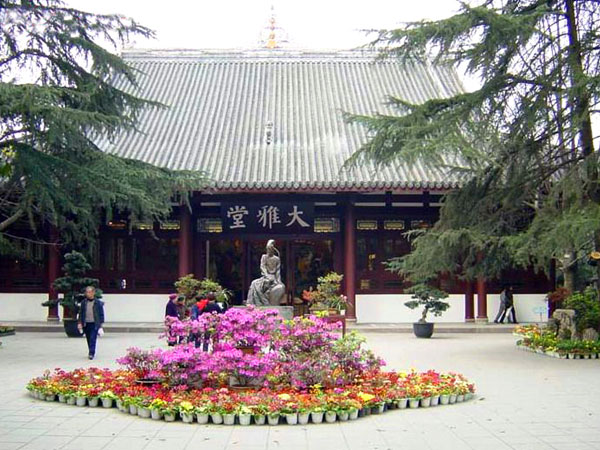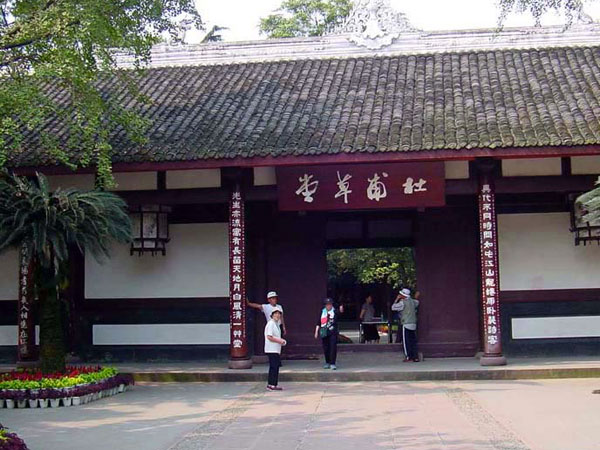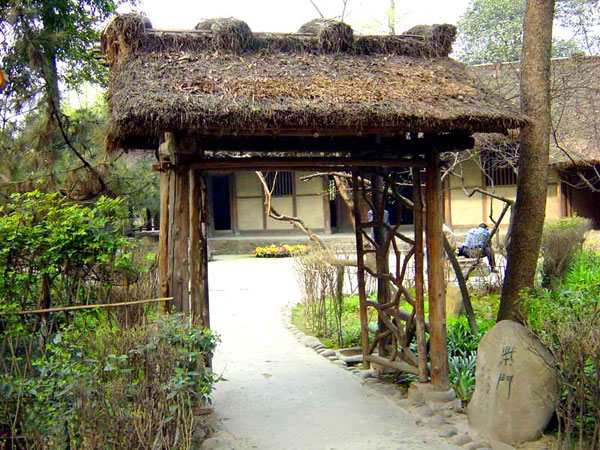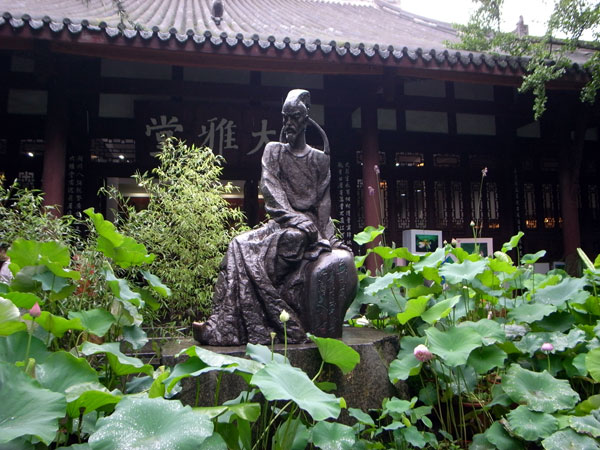Thatched Cottage of Du Fu is the former residence of the famous Tang Dynasty poet, Du Fu. Compelled by poverty and social upheaval in the year of 759 A.D., Du Fu moved from Gansu Province to the outskirts of Chengdu and built a thatched hut.
During nearly four years of his stay here, Du Fu composed more than 240 poems reflecting upon the misery and the real life of the common people. Although the original residence disappeared long ago, the site was renovated in the Ming and Qing dynasties and enlarged to its present scale as a park with fine gardening.
A symbolic thatched hut was built to give visitor association to the original site. The poet's thatched cottage is esteemed as the holy land of Chinese traditional literature, and the place to memorize this Saint of Poem.
History
Thatched Cottage of Du Fu in Chengdu, is China's Tang dynasty poet Du fu dwelling place when he stayed in Chengdu. In the winter of 759 AD, in order to keep away "An-Shi Rebellion", he took his family along went to Chengdu via Longyou (now in southern Gansu province). In the spring of the next year, with the help of friends, he moved to the western suburbs of Chengdu picturesque Huanhua Stream and built a thatched cottage to live in. The following spring, the cottage was finished which referred to as “Chengdu Thatched Cottage”. He has lived here for nearly four years, because he had been granted “calibration ministry assistant department director” title, here also called Du Ministry. Dufu’s friend Yanu died in 765, Dufu was a fish out of water and had to say goodbye to Chengdu.

|
After Dufu left Chengdu, the thatched cottage was not existed. The Five Dynasties Shu Kingdom poet Weizhuang found thatched cottage sites and he rebuilt cottage. Dufu thatched cottage was repaired during the Song, Yuan, Ming and Qing dynasty. In March 1961, it was listed as one of the first batch of national key cultural relics protection units by the state council, and in May 1985, Dufu Thatched Cottage Museum was established. In December 2006 Dufu Thatched Cottage was rated as national AAAA level scenic spots by the national tourism administration, in May 2008 it was rated as the first national level cultural heritage museum by the state administration.
What to see
Dufu Thatched Cottage complete preserved the reconstruction pattern during Qing dynasty Jiaqing period, with a total area of nearly 300 acres. Gardening is a very unique "hybrid" of Chinese classical gardens. According to the functional areas, the museum is divided into: cultural relics tourism area (Thatched Cottage Sites), Botanical Garden Scenic Spot Area (Plum Garden) and Service Center (Thatched Cottage Temple).
【
Hall of Odes】
The name “Hall of Odes” originates from the Major Odes in Book of Songs. There are displayed a large glazed lacquer painting and 12 statues of ancient poets in this 500 square meters hall. The glazed lacquer painting extends 64 square meters and is by far the largest one nationwide. This mural is serial pictures and Dufu’s most representative poems, which explained the sage poet’s living and creation experiences with great vividness. The content of these pictures are about his major events in life, such as roaming around in youth, failure in political ambition in Chang’an, departure from home to be away from revolts, stay in Chengdu, detainment in Kui prefecture, and roving in Hunan.
【
Memorial of the Poet-Historian】
Memorial of the Poet-Historian is the third part building on the central axis, and also the main architecture of the museum. Dufu left 1400 poems which showed the vivid social life after An-Shi Rebellion and had profound reflection of the social transition when the Tang Dynasty declined from prosperity, hence his title “Poet Historian” and the name of this building.
【
Gongbu Shrine】
Gongbu Shrine is the last major part of the memorial architecture compound of this museum and is the place where the statue of Du Fu is seated and where sacrifice is offered. Dufu once was an advisor in Gongbu (the Ministry of Civil Works), hence this shrine named “Gongbu Shrine”.
The hall has a room and three principle columns of a hall. Dufu statue carvings of Ming and Qing dynasty are placed in the middle inside this building, the stone carving of Dufu bust of Ming dynasty Wanli period 30th year (1602) was the earliest preserved stone carving of Dufu Thatched Cottage. And there was the statue of Lu You and Huang Tingjian flanked and escorted on both sides of Dufu statue. The stone statues in Ming and Qing Dynasty, as well as the two stone carving pictures of Qianlong and Jiaqing reign of Qing Dynasty are precious cultural relics.
【
Shaoling Thatched Cottage Tablet Pavilion】
Shaoling Thatched Cottage Tablet Pavilion is one of the most representative buildings of Dufu Thatched Cottage, which is a pavilion used thatch as roof, and inside the pavilion there is a tablet carved Shaoling Thatched Cottage in Chinese. The calligraphy on the tablet was wrote by Prince Guo, Son of Emperor Kangxi in Qing Dynasty. Shaoling, is another alias of Du Fu. He once lived in the south of Chang’an (now it is called Xian) where Emperor Xuan of Han Dynasty and his empress were buried after their death. The mausoleum of the emperor was named “Duling”, while the lesser mausoleum of the empress was named “Shaoling”. Since Dufu once lived nearby, he called himself “Duling Wild Graybeard” or “Shaoling Wild Graybeard”
【
Flower Path】
There was a path grew with flowers and trees on the both sides in front of the thatched cottage, and Dufu wrote in his poem, “The flowery path has never been cleared for the visit of a guest”. Now the Flower Path is a narrow lane connects Dufu Thatched Cottage building group and original Thatched Cottage Temple. At the end of the Garden Path, there is a screen wall with handwriting “Thatched Cottage” by Zhou Shanpei in Qing Dynasty but was ruined and then substituted by his younger brother, Zhou Zhujun. In 1958, Chairman Mao took a photo here when he inspected Dufu Thatched Cottage. As one of symbols of thatched cottage, most of tourists will take pictures here。
【
Plum Garden】
Plum Garden is located in the northwest corner of thatched cottage, covers an area of tens of mu, the original is a private garden, and after the founding of new China it is under management of thatched cottage. Pass Memorial of the Poet-Historian and to the west via the water sill, wear moon gate, the garden is at hand. Standing outside the moon gate, you can see a four-storey 2-foot-tall tower aloft the lake, and a zigzag bridge across lake. Tower shadow reflected in the water, and in concert with curved bridge, while the moon gate is like the frame.
【
Cultural Relics of Tang Dynasty】
Cultural Relics of Tang Dynasty is located in the northeast of Dufu Thatched Cottage. In the end of the year 2001, a large scale of ruins of household and cultural relics in Tang Dynasty was excavated on the west side of the Front Gate and in the northeast of Gongbu Shrine. The relics vastly enriched historic and cultural connotation of Dufu Thatched Cottage and verified the description of living condition and living scene by Dufu in his poems. It also serves as an evidence of the historical development of the Cottage, adds to its profound cultural connotation, and fills the gap of large scale excavation of civilian ruins in Chengdu area.
【
Pagoda】
On 15 September, 2004, the construction of Chengdu Dufu Thatched Cottage Museum started to restore the Pagoda of Buddha. The reconstructed Pagoda stands in the forest of east of thatched cottage. It recovered the style and features of “there is Chongli Pavilion in the east and Pagoda in the west” of historical cultural city Chengdu City.
How to get to Dufu Thatched Cottage
You can take the public bus pass Dufu Thatched Cottage is bus No.208, 82, 59, 35, 170, 58, and 165.








